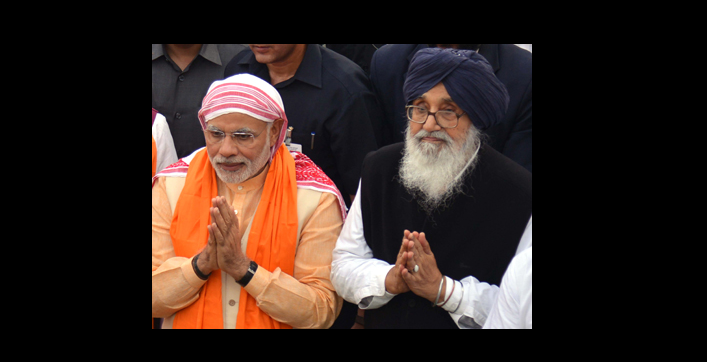PM Modi's Politics Rolls Over Economics: Chandigarh Opens UP for BJP?

NEW DELHI: The Bharatiya Janata Party has won 20 of the 26 seats it contested in the Chandigarh Municipal elections that were fought largely on the issue of demonetisation. The Akali Dal in alliance with the BJP secured one seat while the Congress slumped to just four. The Aam Aadmi Party that will be contesting the forthcoming Assembly elections had not contested these local polls.
The massive win is a clear indication that Prime Minister Narendra Modi might not have done his economics right, but made sure that he got his politics right as this is what matters in the final analysis with the voter. At least initially, before too many months have passed for the adverse impact of bad economics to have set in.
The BJP went into the local elections asking for votes in PM Modi’s name. The Congress whipped up a campaign against demonetisation but clearly was unable to convince the Chandigarh voter how this has worked against his or her interests, if at all. The BJP has thus emerged from the hotly contested polls, elated and triumphant, with party leaders now confidently predicting a Uttar Pradesh sweep,
PM Modi set into motion the following propaganda:
1. It is a bold move to weed out corruption and fake currency and terror funding, and one that only a strong PM can take;
2. It is a move taken at dire risk, with the PM’s life itself coming under threat;
3. It is a pro-poor move, anti-rich with the PM openly mocking the black money ‘rich’ offenders even as he appealed to the poor to side with him;
4. It is a courageous move fraught with some problems that will be overcome, if the poor and the honest side with him against the rich and the corrupt;
5. All those opposing the move are rich and/or corrupt;
6. The poor will get money into their accounts, if not directly then through the bosses whose money should not be returned, as the PM has said. It is your money now, and the government will support you in this.
In brief, PM Modi assisted by the RSS cadres that have fanned out into the districts, and particularly in UP, has been able to establish his pro-poor credentials across the country with this one move. And he knows, as well as do the economists, that by the time recessionary conditions take hold the crucial elections in UP will be over. He has been able to convert the issue into poor versus rich , keeping the rhetoric simple as is clear through his public rallies, and basic.
So while the economists and public intellectuals scoff at him, as a senior Janata Dal(U) leader said, the public believes him and his assurance that the corrupt and the rich have been hard hit. The support has thus grown, if the Chandigarh elections can be taken as a benchmark, out of the conviction “we might be suffering, but they (rich) have suffered more.” This propaganda is further endorsed by the media with most television channels and larger newspapers---including regional language media---supporting demonetisation per se.
The Opposition has been unable to cut through the propaganda as it has not developed a language for the poor, in what PM Modi has managed to turn into a class war of sorts. While speaking for the poor, the Opposition parties have been countering the demonetisation through economic arguments that do not strike a chord with the poorer sections who are suffering in the queues and yet are voting for the BJP. In Uttar Pradesh for instance, the government has tried to ensure a more regular supply of money to the banks with the hardship being faced say for instance, the citizens in Delhi being vastly reduced. BJP leaders are optimistic that by the time the Assembly elections are held the visible chaos of demonetisation would have subsided sufficiently.
The Congress party that held just one seat less than the 12 held by the BJP-Akali Dal in the last muncipality has some serious soul searching to do, as it has been getting a steady beating in local elections, by elections and Assembly polls for the last couple of years. In power effectively only in Karnataka amongst the larger states of India, the Congress leadership has been unable to revive the party at even local levels. Corruption, for instance, has attached itself to the Congress that feeds into the BJP propaganda of the ‘rich and the corrupt’ being against demonetisation when it opposes the move. This is visible in its extremely poor performance in Chandigarh where it has been reduced to just four wards.
PM Modi, by personalising his pitch, seems to have succeeded in projecting himself as the messiah of the poor. The BJP and the RSS hope to gain from this in UP, and also to gain substantially from the divide in the vote bank of the Congress, BSP and Samajwadi party in what will continue as a poor versus rich projection laced with communalism and terrorism thrown in. A great deal will lie in the ability of BSP leader Mayawati to queer the pitch, and it remains to be seen whether she will succeed in luring back the Dalit vote that had moved to the BJP in the 2014 Lok Sabha elections, and win over a majority of the largely Samajwadi-loyal Muslim vote. The SP is currently bogged under the weight of its familial feud, while the Congress despite some effort has been unable to make a dent of any considered significance so far, in UP.
Chandigarh, the first election albeit local, to be fought directly over demonetisation, has given the BJP a shot in the arm. And demonstrated that mastery over politics can still seduce the people of India in a reality where economics remains too tough to comprehend by those living at the bottom of the ladder anyway.



